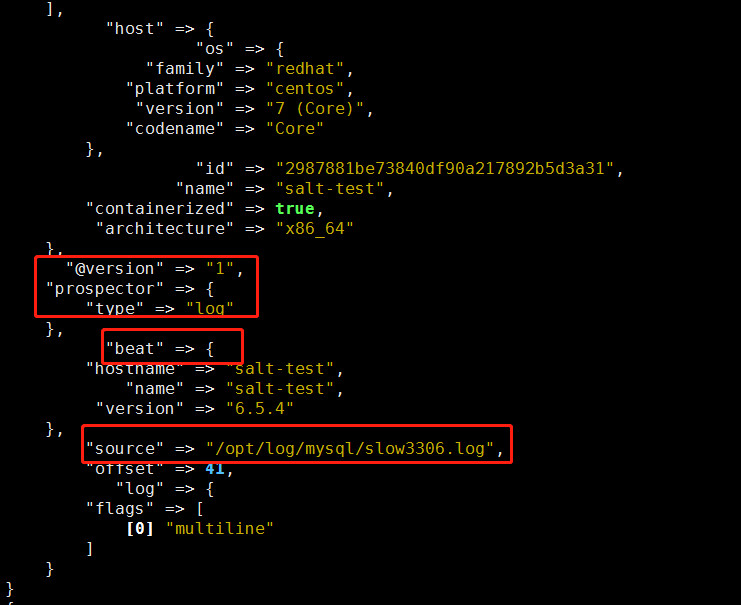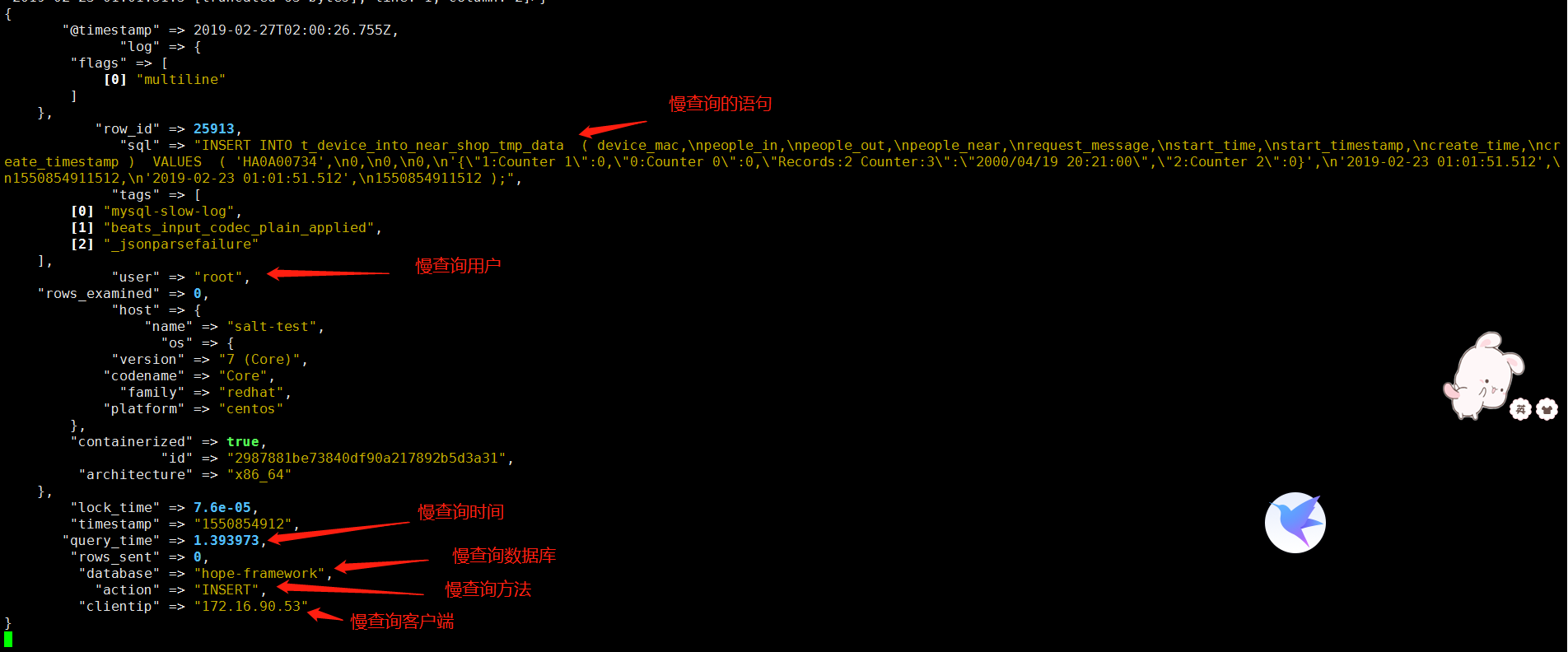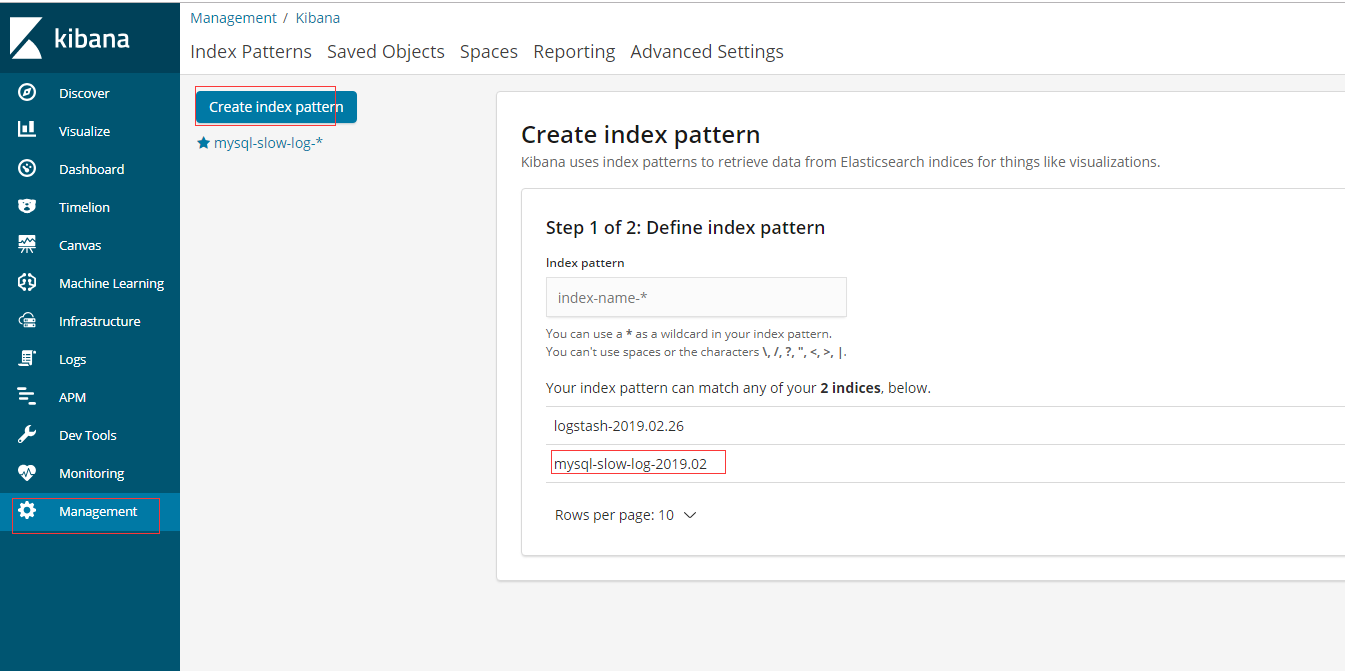使用ELK收集分析MySQL慢查询日志
参考文档:https://www.cnblogs.com/bixiaoyu/p/9638505.html
MySQL开启慢查询不详述
MySQL5.7慢查询日志格式如下
1 2 3 4 5 6 7 8 9 10 11 12 13 14 15 16 17 18 19 20 21 22 23 24 25 | /usr/local/mysql/bin/mysqld, Version: 5.7.22-log (MySQL Community Server (GPL)). started with:Tcp port: 3306 Unix socket: /tmp/mysql3306.sockTime Id Command Argument# Time: 2019-02-23T01:01:52.922426+08:00# User@Host: root[root] @ [172.16.90.53] Id: 25913# Query_time: 1.393973 Lock_time: 0.000076 Rows_sent: 0 Rows_examined: 0use hope-framework;SET timestamp=1550854912;INSERT INTO t_device_into_near_shop_tmp_data ( device_mac,people_in,people_out,people_near,request_message,start_time,start_timestamp,create_time,create_timestamp ) VALUES ( 'HA0A00734',0,0,0,'{"1:Counter 1":0,"0:Counter 0":0,"Records:2 Counter:3":"2000/04/19 20:21:00","2:Counter 2":0}','2019-02-23 01:01:51.512',1550854911512,'2019-02-23 01:01:51.512',1550854911512 ); |
MySQL主机安装filebeat修改配置文件/etc/filebeat/filebeat.yml
1 2 3 4 5 6 7 8 9 10 11 12 13 14 15 16 17 18 19 20 21 22 23 24 25 26 27 28 29 30 | filebeat.inputs:- type: log enabled: true paths: - /opt/log/mysql/slow3306.log #- c:\programdata\elasticsearch\logs\* exclude_lines: ['^\# Time|^/usr/local/mysql/bin/mysqld|^Tcp port|^Time'] #排除行 multiline.negate: true #多行合并 multiline.match: after multiline.pattern: '^\# User|^\# Time' tags: ["mysql-slow-log"] #打一个tagsfilebeat.config.modules: path: ${path.config}/modules.d/*.yml reload.enabled: falsesetup.template.settings: index.number_of_shards: 3setup.kibana:output.logstash: #输出至logstash hosts: ["192.168.1.4:5044"]processors: - add_host_metadata: ~ - add_cloud_metadata: ~ - drop_fields: #删除无用的字段 fields: ["beat", "input", "source", "offset", "prospector"] |
PS:删除的无用字段为以下几个字段

修改logstash输出测试/etc/logstash/conf.d/filebeat-logstash.conf
1 2 3 4 5 6 7 8 9 10 11 12 13 | input{ beats{ port => 5044 }}output{ if "mysql-slow-log" in [tags] { stdout{ codec => rubydebug } } } |
运行logstash
/usr/share/logstash/bin/logstash -f /etc/logstash/conf.d/filebeat-logstash.conf
多行输出如下

增加filter过滤
1 2 3 4 5 6 7 8 9 10 11 12 13 14 15 16 17 18 19 20 21 22 23 24 25 26 27 28 29 30 31 32 33 34 35 36 | input{ beats{ port => 5044 }}filter { if "mysql-slow-log" in [tags] { json { source => "message" } grok { match => [ "message" , "(?m)^#\s+User@Host:\s+%{USER:user}\[[^\]]+\]\s+@\s+(?:(?<clienthost>\S*) )?\[(?:%{IPV4:clientip})?\]\s+Id:\s+%{NUMBER:row_id:int}\n#\s+Query_time:\s+%{NUMBER:query_time:float}\s+Lock_time:\s+%{NUMBER:lock_time:float}\s+Rows_sent:\s+%{NUMBER:rows_sent:int}\s+Rows_examined:\s+%{NUMBER:rows_examined:int}\n\s*(?:use %{DATA:database};\s*\n)?SET\s+timestamp=%{NUMBER:timestamp};\n\s*(?<sql>(?<action>\w+)\b.*;)\s*(?:\n#\s+Time)?.*$" ] } date { match => ["timestamp_mysql","UNIX"] #这里我们需要对日志输出进行时间格式转换,默认将timestamp_mysql的unix时间格式之后直接赋值给timestamp target => "@timestamp" } mutate { remove_field => "@version" #版本字段,删除不需要的字段 remove_field => "message" #在上述,我们已经对mysql的慢日志输出分段了,所以message输出已经是多余的了,故此删除 } }}output{ if "mysql-slow-log" in [tags] { elasticsearch{ hosts => ["192.168.1.4:9200"] index => "mysql-slow-log-%{+YYYY.MM}" } stdout{ codec => rubydebug } }} |
运行再次输出测试

输出至elasticsearch即可使用kibana查询
在kibana添加







【推荐】国内首个AI IDE,深度理解中文开发场景,立即下载体验Trae
【推荐】编程新体验,更懂你的AI,立即体验豆包MarsCode编程助手
【推荐】抖音旗下AI助手豆包,你的智能百科全书,全免费不限次数
【推荐】轻量又高性能的 SSH 工具 IShell:AI 加持,快人一步
· SQL Server 2025 AI相关能力初探
· Linux系列:如何用 C#调用 C方法造成内存泄露
· AI与.NET技术实操系列(二):开始使用ML.NET
· 记一次.NET内存居高不下排查解决与启示
· 探究高空视频全景AR技术的实现原理
· 阿里最新开源QwQ-32B,效果媲美deepseek-r1满血版,部署成本又又又降低了!
· AI编程工具终极对决:字节Trae VS Cursor,谁才是开发者新宠?
· 开源Multi-agent AI智能体框架aevatar.ai,欢迎大家贡献代码
· Manus重磅发布:全球首款通用AI代理技术深度解析与实战指南
· 被坑几百块钱后,我竟然真的恢复了删除的微信聊天记录!